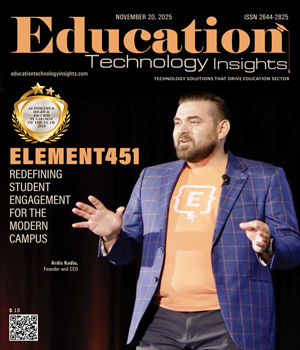THANK YOU FOR SUBSCRIBING
Be first to read the latest tech news, Industry Leader's Insights, and CIO interviews of medium and large enterprises exclusively from Education Technology Insights
Student-Centric Strategies in Designing Ethical AI Framework
Dr Peter Yau, Assistant Professor in Computing Science, University of Glasgow and Dr Raymond Chan, Assistant Professor, Singapore Institute of Technology
 Dr Peter Yau, Assistant Professor in Computing Science, University of Glasgow and Dr Raymond Chan, Assistant Professor, Singapore Institute of Technology
Dr Peter Yau, Assistant Professor in Computing Science, University of Glasgow and Dr Raymond Chan, Assistant Professor, Singapore Institute of TechnologyIn contemporary higher education, integrating Artificial Intelligence (AI) aims to foster a fair and equitable academic environment. I recently moderated a webinar titled "Developing Transparent and Accountable Ethical AI Technologies to Build Trust in Higher Education", a side event for the 10th Multi-stakeholder Forum on Science, Technology and Innovation for Sustainable Development Goals. Supported by the University of Glasgow and contributions from experts and panel speakers, we engaged in insightful discussions with educators, technologists, and institutions about enhancing human connection and learning outcomes through AI.
Key topics included the co-creation of AI technologies with a human-centric design, emphasizing ethics, accountability, transparency, and collaboration in AI's educational deployment. This article outlines four major points discussed from the webinar, additionally featuring a cybersecurity recommendation by Dr. Raymond Chan on the insights from our self-assessment experimental platform for real-time computing science system that addressed ethical AI concerns.
1. Human-Centric Design and Co-Creation: The cornerstone of trustworthy AI integration in higher education is a humancentric design approach, focusing on collaboration with students. The webinar highlighted co-designing learning materials as a transformative pedagogical approach. Putting students at the center of their educational journey ensures that the learning tools and modules created are tailored to their preferences and learning styles. By conducting needs assessments and gathering student feedback, educators can directly influence the design of interactive modules and use AI-driven platforms like Microsoft Azure Foundry and Unity AI. This direct involvement engenders a sense of ownership, making learning experiences both inclusive and personalized.
"Putting students at the center of their educational journey ensures AI technologies are inclusive, personalized, and aligned with their needs"
2. Accountability and Transparency in AI Technologies:
Transparency and accountability are critical in fostering trust between students and AI systems. During the discussions, speakers emphasized the importance of embedding ethical principles into AI technologies. Students should be authenticated through secure systems, such as institutional mobile applications or web interfaces, to access learning resources. Such measures ensure the protection of privacy and data integrity. By incorporating these principles, institutions not only enhance the student learning experience but also build trust in the fairness and accountability of AI interactions.
3. Empowering Students as Co-Creators: The role of students as co-creators in their educational journey was another focal point. The idea goes beyond democratizing the classroom, transforming students into collaborators, innovators, and virtual AI-literate citizens. By participating in the co-creation of AI models and content, students learn about AI's inner workings and contribute to a more democratic and interactive educational environment. This participatory model enhances student engagement, improves learning outcomes, and strengthens trust between educators and students.
4. Future Implications and Preparedness for AI Integration: The speakers shared a visionary perspective on how AI is poised to revolutionize education over the next five years. While AI holds the potential for immense convenience and transformation, there is also a caution against over-reliance on these technologies without critical oversight. The call to action was clear: embrace AI's opportunities while ensuring that educators and students remain vigilant about its applications. The responsibility lies in continuous adaptation and preparation for the evolving educational landscape.
Privacy and Cybersecurity Concerns
The adoption of AI introduces new concerns in the areas of cybersecurity and privacy. For instance, questions arise regarding whether AI systems should be permitted to train on student records or respond to queries that may contain personally identifiable information. It is important to establish a comprehensive framework that clearly defines the types of data permissible for training purposes. Robust security testing mechanisms must be implemented to ensure that AI systems do not inadvertently disclose any student personal information in their responses.
As students increasingly rely on AI to support their assessments, it becomes crucial to ensure that AI applications are designed to promote learning rather than simply providing direct solutions. AI systems should be capable of identifying prompts that indicate an intention to bypass the learning process and, instead, guide students toward solving problems independently. For example, in the context of quizzes or other evaluative tasks, the AI should be able to detect potential instances of academic dishonesty and respond in a way that discourages such behavior while reinforcing educational objectives.
Summary
Above sharing from experts provided insights on the framework development of ethical AI technologies that prioritize transparency, accountability, and co-creation in higher education. This collaborative discourse underscored the significance of student-centric strategies in designing AI tools, ensuring that students are not only the beneficiaries of AI but also active participants in its development. Once again, thank you to all participants, discussants, project partner Dr Raymond Chan (Singapore Institute of Technology) and panel speakers: Associate Professor Dennis Wong (Macao Polytechnic University), Lee Stott (Microsoft), Dr. Kate Lee (National University of Singapore), Dr. Kimberly Davis (University of Glasgow), and Ejoe Tso (Microsoft MVP in AI).
Read Also
Navigating Course Map Design
Beyond the Classroom: Supporting Belonging and Wellbeing for International Students
Building Responsible AI Practice Across a University
Designing Engagement That Lasts
Digital Creativity as a Catalyst for Deeper Learning
Protecting Precious Cargo: A Comprehensive Look at School Bus Safety

I agree We use cookies on this website to enhance your user experience. By clicking any link on this page you are giving your consent for us to set cookies. More info

However, if you would like to share the information in this article, you may use the link below:
www.educationtechnologyinsightseurope.com/cxoinsights/dr-peter-yau-nid-3274.html




















